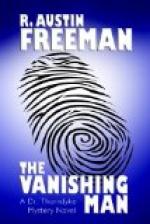“What circumstances?” asked Mr. Jellicoe.
“I mean the way in which he vanished from Mr. Hurst’s house.”
“In what way did he vanish from it?”
“Well, of course, I don’t know.”
“Precisely. Neither do I. Therefore I can’t say whether that way was a mysterious one or not.”
“It is not even certain that he did leave it,” I remarked, rather recklessly.
“Exactly,” said Mr. Jellicoe. “And if he did not, he is there still. And if he is there still, he has not disappeared—in the sense understood. And if he has not disappeared, there is no mystery.”
I laughed heartily, but Mr. Jellicoe preserved a wooden solemnity and continued to examine me through his spectacles (which I, in my turn, inspected and estimated at about minus five dioptres). There was something highly diverting about this grim lawyer, with his dry contentiousness and almost farcical caution. His ostentatious reserve encouraged me to ply him with fresh questions, the more indiscreet the better.
“I suppose,” said I, “that, under these circumstances, you would hardly favour Mr. Hurst’s proposal to apply for permission to presume death?”
“Under what circumstances?” he inquired.
“I was referring to the doubt you have expressed as to whether John Bellingham is, after all, really dead.”
“My dear sir,” said he, “I fail to see your point. If it were certain that the man was alive, it would be impossible to presume that he was dead; and if it were certain that he was dead, presumption of death would still be impossible. You do not presume a certainty. The uncertainty is of the essence of the transaction.”
“But,” I persisted, “if you really believe that he may be alive, I should hardly have thought that you would take the responsibility of presuming his death and dispersing his property.”
“I don’t,” said Mr. Jellicoe. “I take no responsibility. I act in accordance with the decision of the Court and have no choice in the matter.”
“But the Court may decide that he is dead and he may nevertheless be alive.”
“Not at all. If the Court decides that he is presumably dead, then he is presumably dead. As a mere irrelevant, physical circumstance he may, it is true, be alive. But legally speaking, and for testamentary purposes, he is dead. You fail to perceive the distinction, no doubt?”
“I am afraid I do,” I admitted.
“Yes; members of your profession usually do. That is what makes them such bad witnesses in a court of law. The scientific outlook is radically different from the legal. The man of science relies on his own knowledge and observation and judgment, and disregards testimony. A man comes to you and tells you he is blind in one eye. Do you accept his statement? Not in the least. You proceed to test his eyesight with some infernal apparatus of coloured glasses, and you find that he can see perfectly well with both eyes. Then you decide that he is not blind in one eye; that is to say, you reject his testimony in favour of facts of your own ascertaining.”




